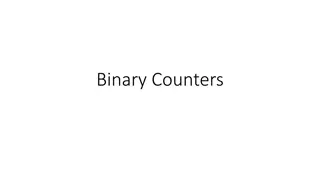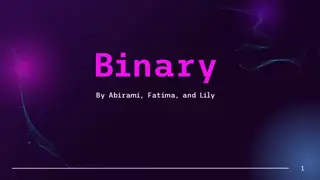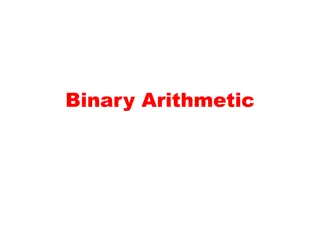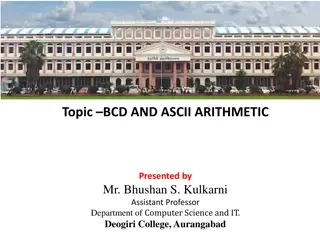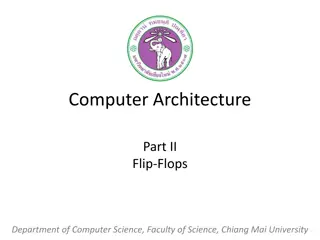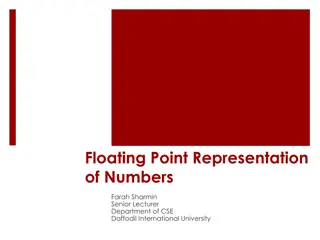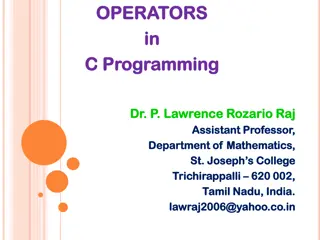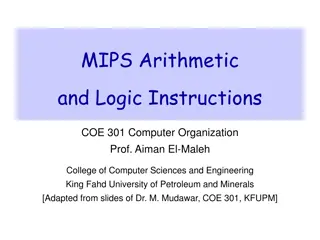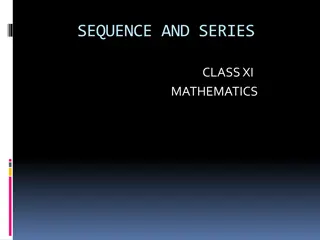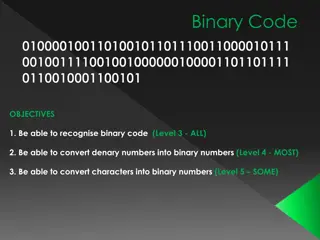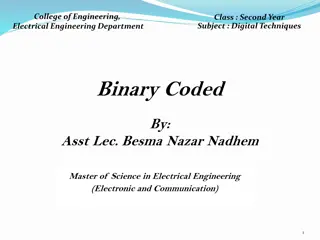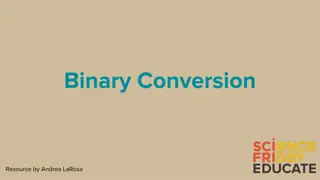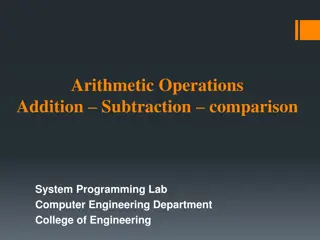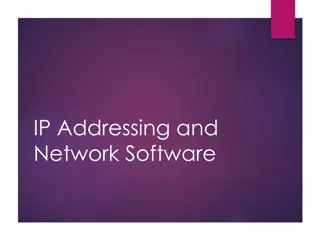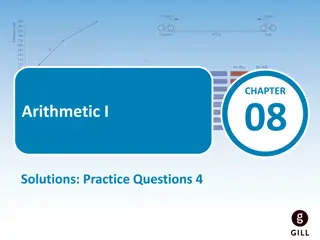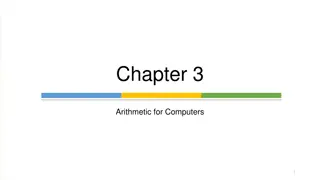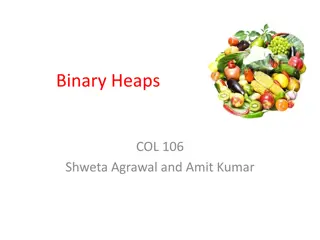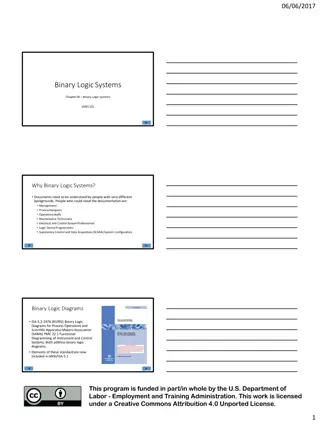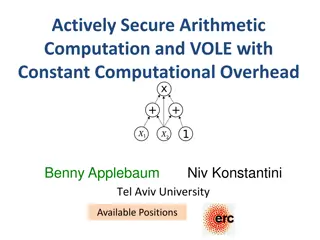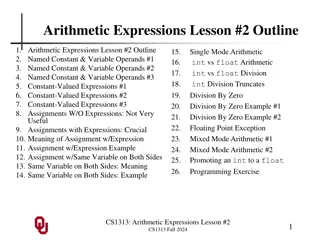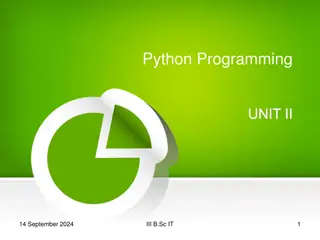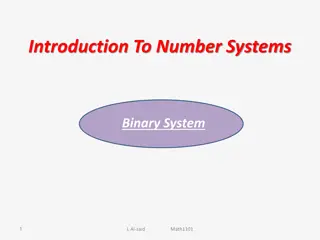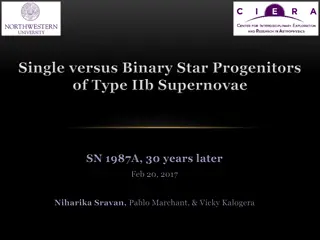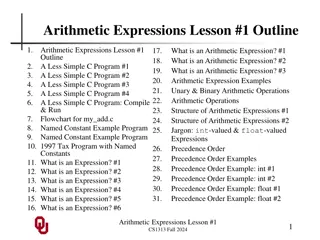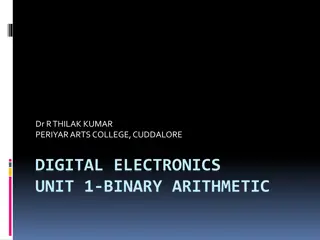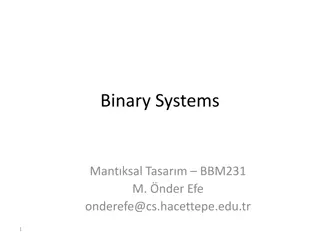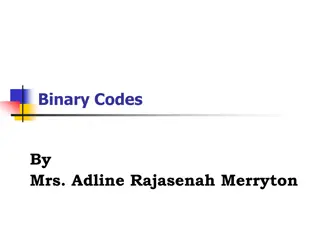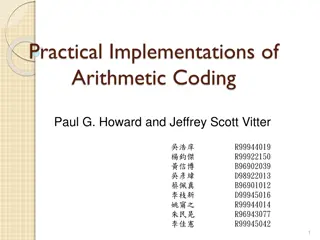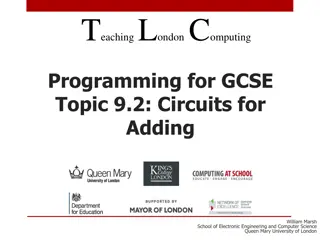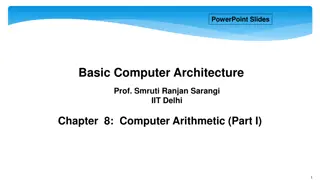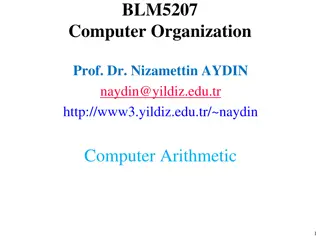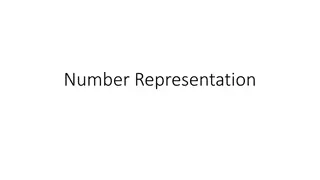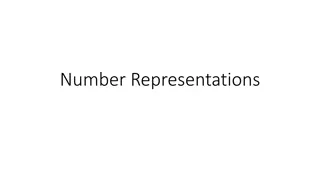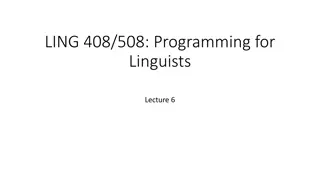Cognitive Load Classification with 2D-CNN Model in Mental Arithmetic Task
Cognitive load is crucial in assessing mental effort in tasks. This paper discusses using EEG signals and a 2D-CNN model to classify cognitive load during mental arithmetic tasks, aiming to optimize performance. EEG signals help evaluate mental workload, although they can be sensitive to noise. The
0 views • 19 slides
Understanding Binary Codes and Their Applications
Binary coding is crucial for digital systems as they understand only 0s and 1s. This process converts information into binary language for processing by digital circuits. Different types of binary codes like weighted codes and BCD codes are used for error correction, digital communication, and compu
7 views • 20 slides
Understanding Binary Counters and Types of Counters
Binary counters are registers used to count clock pulses, while binary counters follow the binary number sequence. There are two types of counters: serial/asynchronous counters and parallel/synchronous counters. Serial counters change output flip-flop to next flip-flop, requiring minimal hardware bu
11 views • 21 slides
Understanding Non-Weighted Codes and Excess-3 Code in Binary Systems
Explore non-weighted binary codes like Excess-3 code, learn how to convert decimal numbers to XS-3 code, advantages and disadvantages of BCD codes, and steps to convert Excess-3 code to binary. Discover the intricacies of binary coding systems with practical examples.
5 views • 55 slides
Understanding Modular Arithmetic and Rings in Mathematics
Exploring the concepts of modular arithmetic and rings in mathematics, including properties, operations, and examples. Learn how modular arithmetic simplifies computations and how rings define closed mathematical systems with specific laws and identities.
6 views • 14 slides
Understanding Binary Number System and its Applications
Explore the world of binary numbers with insights on what binary is, its significance in computing, conversion methods between binary and decimal, hexadecimal number system, and binary arithmetic operations. Dive into the foundations of digital communication through the language of zeros and ones.
0 views • 24 slides
Binary Arithmetic
Explore the world of binary arithmetic, including addition, subtraction, multiplication, and division. Learn the rules and examples of performing basic binary operations efficiently. Understand how to convert binary numbers to decimal equivalents. Enhance your understanding with visual explanations
0 views • 51 slides
Understanding BCD and ASCII Arithmetic in 8086 Assembly Language
BCD (Binary-Coded Decimal) and ASCII (American Standard Code for Information Interchange) are key concepts in 8086 assembly language for numerical and character manipulations. BCD Arithmetic involves addition and subtraction techniques using instructions like DAA and DAS. The adjustment instructions
1 views • 21 slides
Understanding Combinational Circuits in Computer Architecture
Combinational circuits in computer architecture play a crucial role in transforming binary information from input data to output data. These circuits consist of logic gates connected in a specific arrangement to process binary data efficiently. Key components such as half-adders and full-adders are
1 views • 48 slides
Understanding Floating Point Representation of Numbers
Floating point representation is crucial in computer arithmetic operations. It involves expressing real numbers as a mantissa and an exponent to preserve significant digits and increase the range of values stored. This normalized floating point mode allows for efficient storage and manipulation of r
0 views • 12 slides
Understanding Arithmetic Operators in C Programming
C programming language provides various arithmetic operators such as addition, subtraction, multiplication, division, and modulo division. Integer division truncates any fractional part, while modulo division produces the remainder of an integer division. When operands in an arithmetic expression ar
1 views • 18 slides
Overview of MIPS Arithmetic and Logic Instructions in COE 301
MIPS Architecture consists of R-Type and I-Type instruction formats for arithmetic, logical, shift, and immediate constant operations. It includes a variety of general-purpose registers and specific units for execution, floating-point operations, and memory handling. The presentation outlines the st
2 views • 29 slides
Understanding Sequences and Series in Mathematics
Sequences and series are fundamental concepts in mathematics, with sequences consisting of terms denoted as a1, a2, a3, ... and series involving the sum of terms in arithmetic and geometric progressions. Learn about arithmetic progression, geometric progression, terms, and formulas for finding sums
1 views • 11 slides
Understanding Binary Code and its Conversion
Computers rely on binary code, consisting of 0s and 1s, to communicate. Learn how to recognize, convert denary numbers to binary, and understand the basics of the computer language. Discover how to create a table for conversion and practice converting numbers to binary in this informative guide.
1 views • 26 slides
Understanding Binary Codes and Self-Complementing Codes
The concept of binary codes, including Binary Coded Decimal (BCD) codes, and self-complementing codes is explored in this informative content. Learn about how decimal numbers are represented in binary form, the structure of BCD codes, and the properties of self-complementing codes like 2421 and Exce
0 views • 34 slides
Understanding Binary Coded Decimal (BCD) and Excess-3 Code
Binary Coded Decimal (BCD) is a binary code used to represent decimal numbers, with the popular 8421 BCD code and its conversion process explained. Additionally, Excess-3 Code, another BCD code, is detailed with an example of finding its code for a given decimal number. Different BCD codes like 4221
0 views • 11 slides
Understanding Binary Code and Color Conversion
Delve into the fascinating world of binary code and learn how it works to represent data digitally. Discover the process of decoding binary pulses into colored pixels, using binary sequences to identify colors, and practicing digital-analog conversion through logic maps. Explore the language of bina
0 views • 20 slides
Recover Lost Funds From Binary Options Fraud Brokers
Are you a victim of a binary options fraud? You can fight back and recover your funds. Report to MychargeBack today! We have helped thousand of binary options fraud victims to get their money back. You can get your funds back from binary options scam
0 views • 15 slides
Overview of 8086 Assembly Language Arithmetic Operations
The 8086 assembly language provides instructions for arithmetic operations such as addition, subtraction, and comparison. These operations are essential for manipulating data in memory and registers. The instructions support various operand types, including registers, memory locations, and immediate
0 views • 24 slides
Understanding IP Addressing and Conversion from Binary to Decimal
Learn about IP addressing, including binary notation, dotted-decimal notation, and the process of converting binary numbers to decimal. Explore the unique features of IP addresses and the steps involved in converting binary to decimal systematically.
3 views • 47 slides
Arithmetic Practice Questions and Currency Conversions
Practice questions involving currency conversions and arithmetic calculations are provided in the content. Various scenarios are presented, such as determining costs in different currencies, finding exchange rates, and comparing prices in different countries based on exchange rates. The questions re
1 views • 25 slides
Understanding Arithmetic Operations for Computers
The chapter delves into the fundamentals of arithmetic for computers, covering operations on integers, dealing with overflow, handling floating-point real numbers, and more. It explores addition, subtraction, multiplication, and division in detail, showcasing examples and techniques for efficient co
4 views • 18 slides
Understanding Binary Heaps: Efficient Data Structure for Priority Queue Operations
Explore the concept of binary heaps, a specialized type of binary tree that allows for quick retrieval of the smallest (or largest) element. Learn how binary heaps excel in finding the minimum value, essential for priority queue applications in operating systems, event simulations, and more. Compare
2 views • 34 slides
Understanding Binary Logic Systems in Documentation
Binary logic systems play a crucial role in documentation for individuals with diverse backgrounds such as management, process designers, operations staff, maintenance technicians, and more. These systems, depicted in binary logic diagrams, provide a clear and concise representation for various prof
4 views • 16 slides
Actively Secure Arithmetic Computation and VOLE Study
Exploring actively secure arithmetic computation and VOLE with constant computational overhead at Tel Aviv University. Understanding how functions are represented in secure computation using arithmetic circuits over boolean circuits. Efficiently evaluating arithmetic circuits over large finite field
0 views • 36 slides
Understanding Arithmetic Expressions and Constants in Programming
Learn about the importance of named constants and variables in arithmetic expressions, how to perform assignments with and without expressions, and the implications of working with integer and floating-point arithmetic in programming. Explore examples and exercises to enhance your programming skills
0 views • 26 slides
Python Programming Expressions and Arithmetic Operators Overview
Learn about expressions, arithmetic operators, value combinations with operators, operator precedence and associativity in Python programming. Understand arithmetic operations, variable assignments, common errors, and examples highlighting key concepts such as unary and binary operators. Enhance you
0 views • 15 slides
Exploring the Binary Number System in Mathematics
Delve into the intricacies of the binary number system with this comprehensive guide. Learn how binary numbers are formed, and master the conversion techniques between binary and decimal numbers. Discover the fascinating world of binary fractions and the algorithms for converting decimal numbers to
0 views • 20 slides
Unveiling the Progenitors of Stripped Envelope Supernovae (SNe)
The mechanism behind the stripping of stripped-envelope SNe remains a key question linked to their progenitors. Various mechanisms such as Single Star Progenitors, Binary Star Progenitors, Stellar Winds, and Close Binary Interactions are thought to dominate the stripping process. Observations of Typ
0 views • 12 slides
Understanding Arithmetic Expressions in C Programming
This lesson outlines the basics of arithmetic expressions in C programming, focusing on how to perform unary and binary arithmetic operations. It covers the structure of arithmetic expressions, precedence order, and examples to illustrate these concepts. The provided C program, 'my_add,' demonstrate
0 views • 31 slides
Introduction to Binary Arithmetic for Digital Electronics
Binary arithmetic is fundamental in digital electronics, involving addition, subtraction, and multiplication of binary numbers. This guide explains the rules and examples of binary arithmetic operations, such as binary addition and subtraction, along with detailed steps and illustrations for better
0 views • 21 slides
Understanding Binary and Numeric Systems in Computing
Delve into the world of binary systems, binary numbers, base conversions, powers of 2, arithmetic operations with binary and octal numbers, and multiplication principles in computing. Learn how to compute values and conversions in various number systems efficiently.
0 views • 41 slides
Understanding Binary Codes and Character Coding Techniques
Binary codes, such as ASCII and EBCDIC, are crucial in representing data in computers and digital systems. They play a key role in error detection and data encoding. This article discusses the basics of binary coding, various types of binary codes, character coding techniques like ASCII and EBCDIC,
0 views • 22 slides
Practical Implementations of Arithmetic Coding
Explore the practical implementations, advantages, and disadvantages of arithmetic coding in this informative guide. Learn about the basic algorithm, dynamic interval expansion, integer arithmetic coding, and methods to improve the speed of arithmetic coding. Dive deep into encoding algorithms, exam
0 views • 78 slides
Understanding Binary Addition Circuits in Computing
Explore the concepts of half adders, full adders, and binary addition circuits used in computer systems. Learn how binary digits are represented as logic levels to perform addition operations. Dive into the working principles of half adders, truth tables, formulas, and circuit diagrams for binary ad
0 views • 15 slides
Understanding Computer Arithmetic Basics: Addition, Multiplication, Division, and More
Delve into the fundamentals of computer arithmetic with concepts such as adding 1-bit numbers, half adders, full adders, equations, circuits, and the addition of n-bit numbers. Explore the intricacies of binary arithmetic operations and learn how computers perform calculations effectively.
0 views • 84 slides
Understanding Computer Arithmetic: ALU, Integer Representation, and Twos Complement
Exploring the fundamental concepts of computer arithmetic including the Arithmetic & Logic Unit (ALU), integer representation methods, and the Twos Complement system. Learn about sign-magnitude, characteristics of Twos Complement representation, benefits, negation techniques, and special cases in co
1 views • 57 slides
Understanding Number Representation and Conversion
Learn how to convert between decimal and binary number representations. Discover the process from decimal to binary by dividing repeatedly by 2, and from binary to decimal by summing the powers of 2. Explore the simplicity of converting between base 16 and base 2, and practice binary addition with e
0 views • 27 slides
Understanding Binary Representation of Numbers with Fractions
Learn how to represent numbers with fractions in binary form. Discover the process of converting real numbers, like 5.75, into binary by separating the integer and fraction parts. Explore the method of obtaining the binary representation of the fraction through division by specific decimal values. U
0 views • 21 slides
Introduction to Shell Arithmetic and Command.bc for Linguists
Today's lecture covers shell arithmetic, positional parameters for shell scripts, making shell scripts executable, and using command.bc for mathematical computations in the shell environment. Examples and demonstrations on shell arithmetic, utilizing the 'expr' command, and leveraging 'bc' command f
0 views • 21 slides


